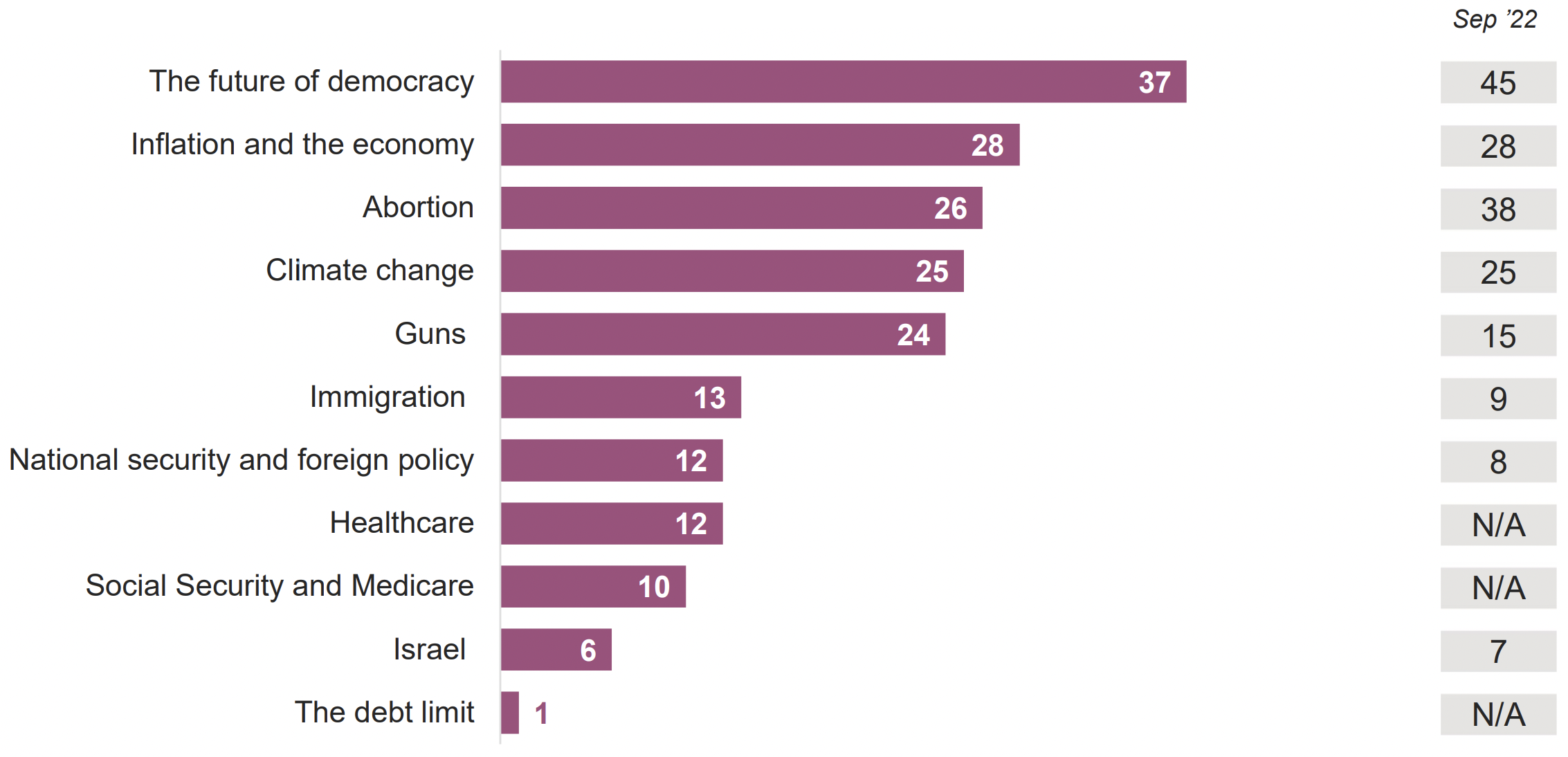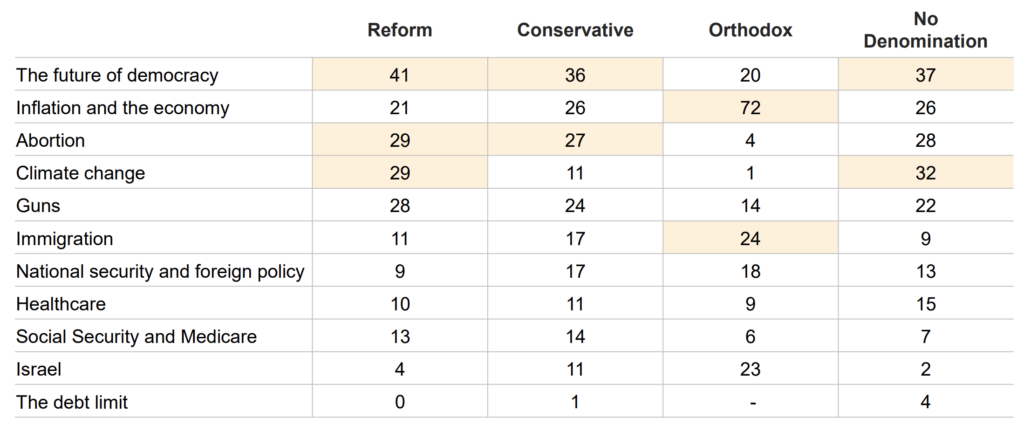
For most of the 20th century, the vast majority of Jews in the United States identified with the Democratic Party and voted for Democratic candidates. Even now, according to Pew, seven in ten Jewish adults identify with or lean toward the Democratic Party, and half describe their political views as liberal. Orthodox Jews stand out as an exception: 60% of Orthodox Jews describe their political views as conservative, with 75% identifying with or leaning towards Republican.
The non-partisan Jewish Electorate Institute (JEI) released its annual national survey of Jewish voters in November 2023. The poll found that Jewish voters remain very focused on cultural issues such as democracy, abortion, guns, inflation, and climate change. The data was published before the atrocity of October 7th and before the current war but, how low Israel ranked as a priority in voting was upsetting even then.

Even among the Orthodox, Israel ranked behind inflation and the economy and immigration:

The pogroms, mass murder, and atrocities of October 7th stunned Israel and those who love her. Reeling from the unimaginable attack, grieving from the horrific loss, worried about the staggering number of hostages, Israel felt isolated and alone and highly uncertain. Immediate statements of strong support from American political leaders and elected officials, coupled with real demonstrations of loyalty to Israel’s security, were critical.
At that time, and in the moments that have followed, we have learned who are true friends of Israel and the Jewish people and who are not. In many cases, the answer is not who we would have predicted. Some of the most vocal and vociferous voices are politicians the pro-Israel community was not very confident about. Take Senator John Fetterman. In the 2022 election, the Orthodox community of Pennsylvania did not exactly embrace Fetterman, a progressive Democrat, or celebrate him as a champion of our causes. And yet, since October 7th, you would be hard-pressed to find a more outspoken, unequivocal, even defiant supporter of Israel. Consistently rejecting the call for a ceasefire and defending Israel’s efforts to destroy Hamas, he recently said, “I would be the last man standing to be absolutely there on the Israeli side on this with no conditions.”
And so, among the many things that have changed as a result of October 7th, I would humbly recommend that the Jewish community would do well to no longer identify with a single party, Republican or Democrat, but to look carefully at every candidate’s position and record on Israel. When we step in a voting booth, we shouldn’t look for an (R) or a (D) but for moral clarity and loyalty on Israel. Understanding how critical support for Israel is militarily, diplomatically, and financially, our top three issues in any election ought to be Israel, Israel, and Israel. As important and meaningful as other issues are, without a strong Israel, Jews are not safe or secure.
We must not fall in love with or identify too closely with either party. We must not be blinded or enticed by how much we may have in common on social or domestic issues with one side or the other, one candidate or another. The pro-Israel community must keep our eye on how pro-Israel a candidate is, with their words and statements and even more importantly, with their practice. We must do a better job at rewarding our friends and calling out our adversaries. We must not ignore or discount the support of an elected official on the basis that they are simply doing what is obvious and right to us. If that senator, member of Congress or the administration as a whole receives much greater feedback, letters and calls against Israel than for it, their vote and voices can easily change.
Our exile in Egypt and the harsh suffering and servitude there began with the fact that וַיָּ֥קם מֶֽלֶךְ־חָדָ֖שׁ עַל־מִצְרָ֑יִם אֲשֶׁ֥ר לֹֽא־יָדַ֖ע אֶת־יוֹסֵֽף , a new king arose over Egypt who did not know Yosef. Chazal debate if it was literally a new king, or the same king who had chosen to forget Yosef’s contribution to saving the Egyptian economy. Some commentators point out that the Jewish people had retreated to live in Goshen, neglecting the relationship with the king and leadership of Egypt. Absent that connection, the king was able to forget, overlook and disregard what the Jews had done to save Mitzrayim.
This lesson of the centuries of servitude is clear. We must never take for granted any relationships with people in positions of power. We must build them, nourish them, educate them, and hold them accountable when it comes to Israel and issue of Jewish concern. Contribute to and be grateful towards those who stand with Israel and against antisemitism. Take the time to write a letter or make a donation. Don’t look for a particular party, look for the heart and soul of those who “get it” on the issues that matter to us. AIPAC is one great resource to track candidates, their positions on Israel, and to take action by writing letters and being in touch, specifically with those who need to hear it to reinforce their correct position or call them out on having the wrong one.
We are blessed to currently have a president, administration, and overwhelming majority of Congress who firmly stand with Israel. While they aren’t perfect and there are positions or statements we wish were different, they fundamentally have Israel’s back, often when it isn’t politically advantageous or comfortable for them. Don’t take that for granted and wait for a new king to arise who doesn’t know us or care about the issues that matter most to us.
{Reposted from the Rabbi’s blog}















